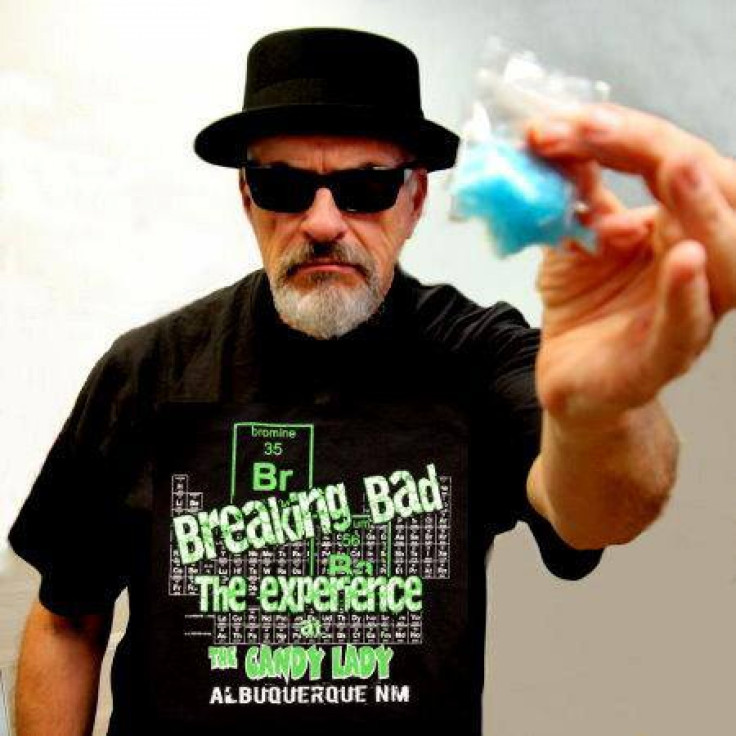The Candy Lady Is Cashing In On ‘Breaking Bad’ And Does Not Care What You Think About It

Debbie Ball may not need silverfish repellent for her bundles of cash, but just like our favorite anti-hero Walter White, she’s profiting from crystal meth – only hers isn’t real. The proprietor of The Candy Lady confectioner in Albuquerque, N.M.-- where "Breaking Bad" is set and filmed -- created the prop crystal meth for the first two seasons of the show (before it turned blue) and for the last year has been selling “dime bags” of “Breaking Bad”-inspired blue rock candy in her store and online. Business is good.
Ball said she got the idea for the dime bags last summer after actor Bryan Cranston brought prop samples to late-night talk show appearances, including the "Late Show with David Letterman.” “I looked at those and thought, I may as well just throw a few out there and see what happens,” Ball said. “And we put a dollar bill [price tag] on it. Because we didn’t know what to charge for it. It seemed like a lot of money... for a little bag of candy that didn’t weigh a whole lot. But we tried it and it worked.” Now Ball can hardly keep up with the demand.
“I’ve been very fortunate,” she said. “We send the candy all over the world.” Ball says her business – which she started with her mother in 1980 -- has had “a lot of ups and downs,” and like many businesses, suffered from the recession of 2008. “We’re kind of just getting back to where we were before the downturn.” Ball, who is 61, said she sold the prop meth for the show – about a hundred pounds’ worth -- at wholesale prices. She requested that I not publish the amount she earned for it – which was surprisingly low—but conceded that it was cheap. “We didn’t make much,” she said, adding, “it’s candy.”
But not everyone thinks what Ball is selling is so innocent. A recent entry on The Candy Lady’s Yelp page condemns what the reviewer described as “subliminal and irresponsible marketing.” Ball said the backlash started last year, after her story was picked up by a number of national news outlets. “I was the subject of the whole ‘Letters to the Editor’ page in Albuquerque Journal, and every single letter, with the exception of one that was kind of half and half, was negative – about how terrible I was, and what kind of message does this send, and ‘Oh, my God, you’re selling this stuff to kids,' and yadda yadda.”
Ball does not feel that she has anything to apologize for. “I’m sick to death of political correctness,” she said. “No one can have any fun anymore.”
Further, Ball feels that “Breaking Bad” does an important public service by exposing the dangers of the meth trade (though she is a few seasons away from being caught up on the show.) “I am a firm believer that ‘Breaking Bad’ is educational,” she said. “And parents should watch it with their children. If you don’t communicate to your children what happens, they are going to learn it from someone else. And they are not going to learn the right message.”
Ball has had firsthand exposure to drug addiction, having lost a family member last year to an overdose that included meth. She recounted a recent conversation with a customer who at one time had a problem with the drug. “I asked her, ‘Did you come in and see my candy and decide to use meth?’ And of course she didn’t.” Ball insists that her candy is no more likely to cause a crystal meth problem than candy cigarettes -- a favorite of hers as a child -- are to get kids smoking. "I've never smoked a cigarette in my life," she said.
Ball is no stranger to candy-related controversy. In 1982, The Candy Lady was hit with a zoning ordinance violation for selling “adult” candy items. (According to a story in the Albuquerque Tribune, The Candy Lady escaped punity when it was determined that the ordinances did not apply to the X-rated sweets.) Though the demand for “Breaking Bad” offerings has taken some of the focus away from the X-rated candy, the adult business continues to thrive. “Think of whatever body part you want and I’ve got it,” Ball said. “They used one of my penises in a movie. I want to say it was called ‘Malice in Wonderland.’” (More likely, the unsavory sweet was used in the 1992 film “Phallus in Wonderland.”)
Ball conceded that there is a serious meth problem in Albuquerque, but doesn’t think it’s any worse in her city than elsewhere in the country. “There’s a big meth problem everywhere, it doesn’t matter where you are. … It’s ugly. It’s everywhere.” Asked if she worried that customers would try to pass off the blue rock candy as the real thing, Ball was unconcerned.
“No, not at all. Because it’s blue,” Ball said. “Case in point, I had a girl come in yesterday and she said, 'We’ve seen the real thing, and this ain’t it.'”
© Copyright IBTimes 2024. All rights reserved.












